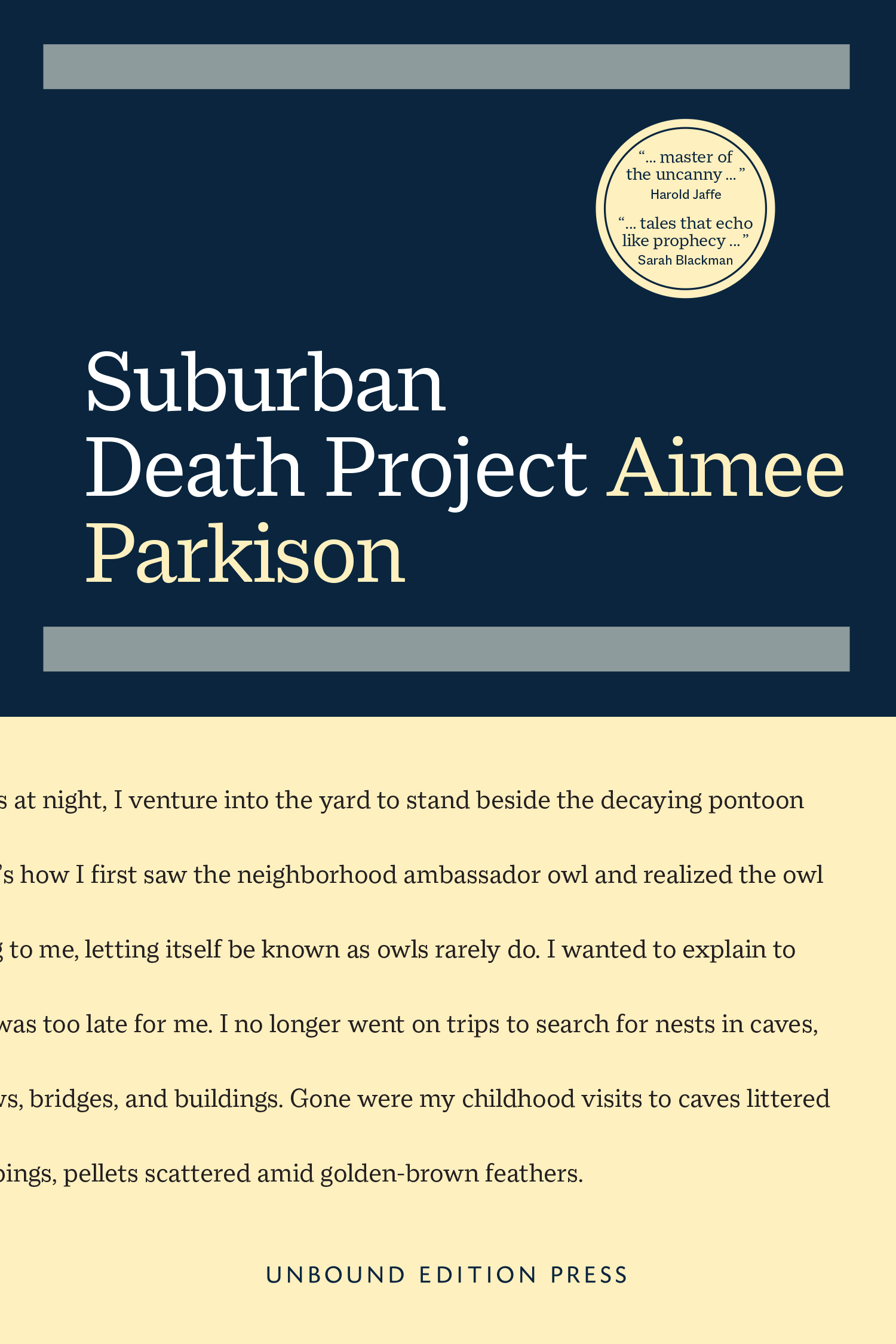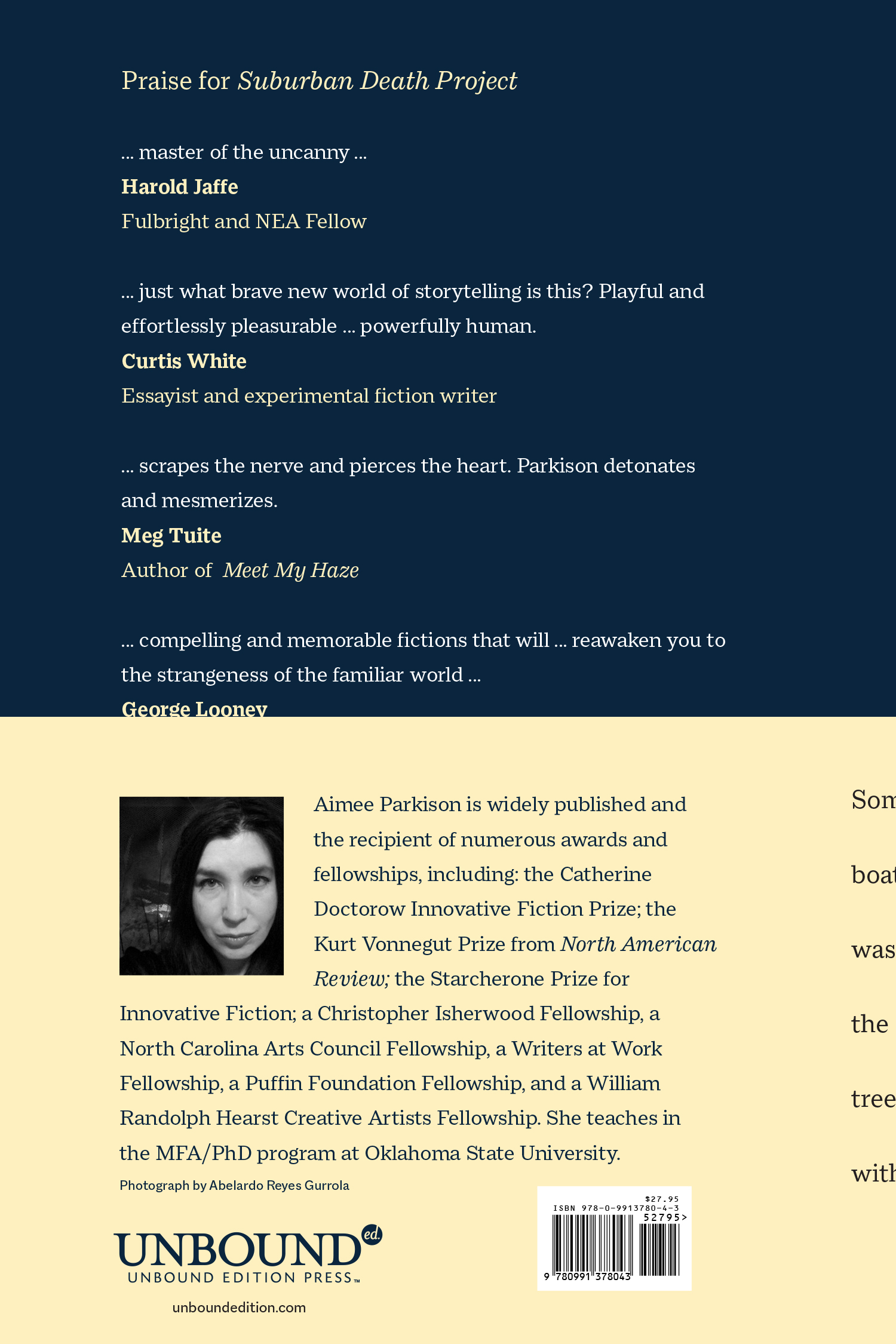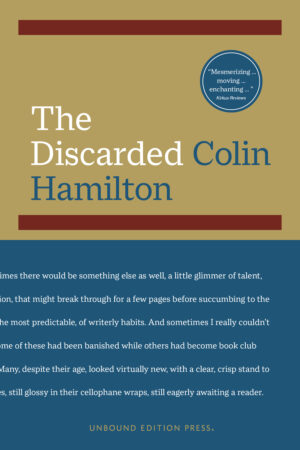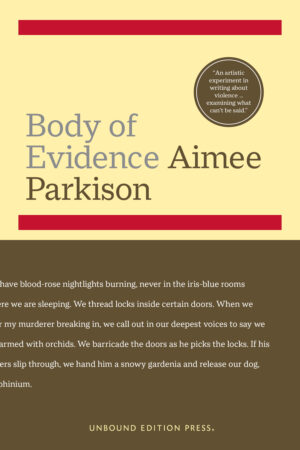Suburban Death Project | Aimee Parkison | Short Fiction
The twelve stories comprising Suburban Death Project sparkle with disturbing brilliance, revealing in full why Aimee Parkison is so widely celebrated for her inventive narratives and experimental fiction. Suburban Death Project breathes life into what is barely surviving: ill-fated families, dangerous relationships, and frightening loves. With a dark humor serving to make unimaginable traumas both tolerable and knowable, Parkison delves into marriage and mourning, lust and loss, and violence and its aftermath.
$27.95
Description
Suburban Death Project, Aimee Parkison
$27.95
ISBN: 9780991378043
Hardback; 176 pages; 5.25”x7.5”
Publication Date: May 17, 2022
“…resembles that master of the uncanny, Patricia Highsmith. High praise.” “Playful and effortlessly pleasurable…powerfully human.” “…scrapes the nerve and pierces the heart. Parkison detonates and mesmerizes.” “…compelling and memorable fictions that will…reawaken you to the strangeness of the familiar world…” “tales that echo like prophecy as they underline, again and again, the inescapably beautiful now.”
Summary
The twelve stories comprising Suburban Death Project sparkle with disturbing brilliance, revealing in full why Aimee Parkison is so widely celebrated for her inventive narratives and experimental fiction. Suburban Death Project breathes life into what is barely surviving: ill-fated families, dangerous relationships, and frightening loves. With a dark humor serving to make unimaginable traumas both tolerable and knowable, Parkison delves into marriage and mourning, lust and loss, and violence and its aftermath. She exposes the horrors of life in its bodily form and relieves them with a passionate wonder burning so brightly it outshines age, death, and family secrets. In average American households, families haunt each other while still alive as they recompose into dragonflies, peach trees, squirrels, ducks, owls, shadows, tunnels, and zoos of endangered species. Pinned to boards for study, peered at by voyeurs, videoed by neighbors, or vivisected for the greater good, each body in these riveting stories undergoes an unflinching examination.
Author
Aimee Parkison is widely published and the recipient of numerous awards and fellowships, including: the Catherine Doctorow Innovative Fiction Prize; the Kurt Vonnegut Prize from North American Review; the Starcherone Prize for Innovative Fiction; a Christopher Isherwood Fellowship, a North Carolina Arts Council Fellowship, a Writers at Work Fellowship, a Puffin Foundation Fellowship, and a William Randolph Hearst Creative Artists Fellowship. She currently teaches creative writing and literature in the MFA/PhD program at Oklahoma State University.
Reviews
“Readers should savor these marvelous stories, as they are sadly over too soon. Extraordinary, character-driven tales from a sublime voice that resonates.”
“The Gothic tales that constitute Aimee Parkison’s Suburban Death Project tend to occur in rural settings with woods and water, which contribute to the nightmarish afflictions that torment her characters. The afflictions’ unexpectedness, along with the subject matter and deceptive sangfroid of the prose, resemble that master of the uncanny, Patricia Highsmith. High praise.”
Harold Jaffe, Fulbright and NEA Fellow, and author of 28 books
“In Aimee Parkison’s Suburban Death Project, mysteries abound: insect actors, the DNA of extinct animals preserved in tattoos, a dildo in lapis lazuli, and, above it all, the mystery of just what brave new world of storytelling is this? Playful and effortlessly pleasurable, Parkison’s Project is also powerfully human.”
Curtis White, essayist, experimental fiction writer, and author of 15 books
“Parkison is a master of the densely coiled secrets that run rampant within the body/couple/suburb/structure. Nothing is left unmined through this explosive collection packed with subterfuge of gaslighting, stalking and what keeps the game of predator/prey interesting and provocative. Suburban Death Project scrapes the nerves and pierces the heart. Parkison detonates and mesmerizes.”
Meg Tuite, author of Meet My Haze
“Stephen Dunn once argued that ‘the good poem maintains a delicate balance between strangeness and familiarity,’ that it ‘must make the familiar strange enough to be re-seen or re-felt by the reader.’ In that sense—as well as in the lyricism of her exacting sentences—the stories in Suburban Death Project are poems. These stories—inhabited by such figures as an amputee who fishes for owls, a woman who can’t stop laughing after her husband’s suicide and who ends up eating his sadness in a peach, and the legend of a runaway girl who lives in a lighthouse and haunts the tunnels of a seaside cave—will startle the reader, it’s true, in the manner that Robert Frost was speaking of when he posited his famous dictum, ‘No tears in the writer, no tears in the reader. No surprise for the writer, no surprise for the reader.’ These compelling and memorable fictions will surprise you, and, yes, disturb you, but they will also move you, and reawaken you to the strangeness of the familiar world, and in so doing they will allow you to return to it as if for the first time, as if it were once again a garden.”
George Looney, author of The Worst May Be Over and Ode to the Earth in Translation
“Who owns the body? Who owns the self? Who can measure the unfathomable future and can we trust them to tell their findings true? In Parkison’s superb new collection, women escape their childhoods by succumbing to their magic; or mourn their husbands by tasting the fruit that grows from their bodies; or claim their destiny by abandoning it to the world. These are stories of blood—almost written in it—but they are rarely stories of violence even when violent acts occur. Rather, Parkison’s wives and daughters, ghosts and surgeons, widows, witnesses, lovers of the night and the deep, dark waters imbue these tales with blood that pulses even as it spills. These are terrible tales that echo like prophecy as they underline, again and again, the inescapably beautiful now. Reader, beware, here the map ends.”
Sarah Blackman, author of Mother Box and Hex







